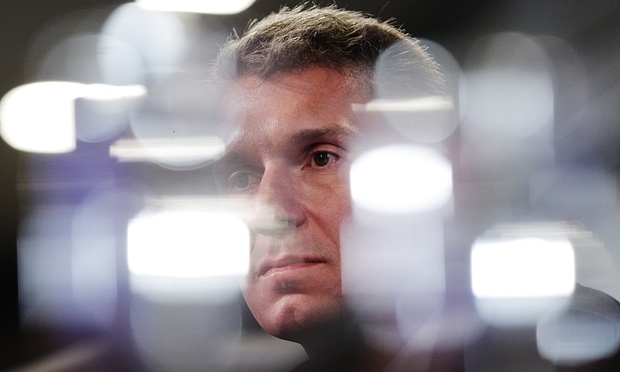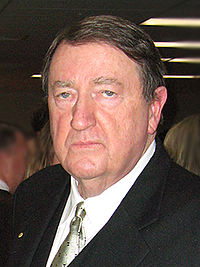Universities in Australia have been hot-beds of radicalism for decades since the social revolt of the 1960’s permeated all facets of academic and student life. Leftist politics has therefore dominated campus politics and student media. It is therefore not surprising that the winner of this year’s Opinion competition at Sydney University’s student magazine, Honi Soit was a short piece that followed the trend of national self-effacement. The article, titled “Nationhood must mean more than beer, sports and Anzacs” by Ben Brooks (second year student of Law and Arts) seemed to portray Australia as an accidental country that sprang out of historical ennui among an ultimately undeserving people. Brooks starts his piece by describing a blissful suburban metropolis as metaphor for “a reluctant nation trapped in an ideological vacuum”, not exactly the most flattering language but something that traditionalists on campus have come to expect. He writes:
It feels a little like Fukuyama’s “End of History” – in this corner of the planet, at least, there is no war, civil turmoil, or widespread poverty. No repression, censors, or revolution. There is just universal, botoxed happiness – the endpoint of mankind’s evolution. It is an apt location to reflect on Australian parochialism.
We will risk being presumptuous in stating from the outset that there may be a multitude across the globe who envy the position this country finds herself: relative early isolation, abundance of natural resources, inherited ideas of government and law which allowed our forefathers to develop civil society, industry and a nation that has been blessed with peace and prosperity at levels few other countries could compare to, or compete with. All this would seem rather appealing, but not to Brooks, who writes:
Like the resort towns for which it is famous, Australia is characterised by a certain existential apathy. It did not coalesce into a nation out of dire necessity. From the First Fleet to Federation, our most troubling strategic foes were European powers in a distant hemisphere. Nor is it a nation born of aspirations. Our most enthusiastic revolution was over the price of rum, not over royal absolutism, or universal rights.
Australia is, rather, a nation forged out of convenience, to standardise railways and remove interstate banana tariffs. There was no one to fight against, but nothing to fight for, either. We have no conscious vision for this nation, and show little overt pride in its institutions.
It becomes clear that this opinion piece is written in the context of progressive ‘cringe culture’. It’s not difficult to imagine the campus bien pensants wincing uncomfortably at displays of the Union Jack, references to Settlement (‘invasion’ is usually preferred), and generally rolling their eyes or smirking derisively at the civilisation produced by the culture and traditionalist loyalties of ‘dead white males’. It is therefore unsurprising that this opinion piece has been awarded a prize at one of the most prestigious and well known Universities in Australia.
The era Ben Brooks refers to in the above extract, one in which the early Australian national identity was forged, was marked by three important factors largely absent today. The first was an overt and unapologetic national virility, strongly associated with its British origins, and one which it was hardly ‘controversial’ to assert in the public arena. It is difficult to imagine the academic or political elites of yesteryear (compared with those that assault us with their insipid national self-flagellation in the media today) being shy about asserting the obvious cultural, political and industrial superiority of British civilisation over that of, for example, Australia’s near-north. The second factor was the evidently comparable backwardness of our local neighbours during those early years of our history. The third, and unlike the elites of today, our forefathers were not prohibited from sharing and proudly expressing an identity that harked back to the homelands of our settlers. This gave rise to an affinity which was shared with the broader Anglosphere and the European world it was connected to. It is not surprising therefore that the “troubling strategic foes” were seen to be the prominent powers in that part of the world that mattered, at least in the minds of those European descended sons of the British Empire in the Antipodes.
This attitude was a product of the relative insignificance of any local threat, coupled with our membership to a larger British and European family of nations with which we had no compunctions to associate spiritually, psychologically and therefore politically, economically and geostrategically. The Anglo-preferential global outlook of those (presumably to Brooks) less ‘enlightened’ years was therefore both natural and reasonable, as was the Euro-centric vision of the cultural and political class of that period. Only an individual cleansed of his national identity and its historical legacies would see it as ‘backward’ (other words commonly used liberal commentators include ‘jingoist’, ‘chauvinistic’, and ‘insular’). This is because such an individual would be fundamentally incapable of understanding the imperative of a people to act as a distinct people, according to their interest, which are in turn defined by their particularist needs and demands.
Moreover, to suggest that Australia is not “a nation born of aspirations” or that Australians have had “nothing to fight for” is simply the libel of an ignoramus. One may struggle to compare the Rum Rebellion to the storming of the Bastille, but somebody at Sydney University should inform Brooks that the genesis of the United States (which he praises later in his piece: “Nationhood there is a system of values – a way of thinking – which pervades policy making and political discourse”) was arguably instigated by a revolt against an excessive tax on tea (we will leave to others to determine whether an alcoholic beverage or an herbal infusion is a more noble subject over which to wage war or mount insurrection). True, unlike the states of Continental Europe who engaged in mass fratricidal war for abstract rights, or caused endless bloodletting to abolish ancient rooted liberties, we Australians have not ‘aspired’ to commit such cyclical acts of national suicide for utopian causes. Has it not occurred to Brooks that the reason for this is simply because there was never any need for such insanity here? Our forefathers had no pressing desire to engage in Jacobin or Yankee experiments because the inherited liberties and ancient rights they then enjoyed seemed to have worked quite well.
The fact that no guillotine was ever used by radicals at the steps of Sydney’s Town Hall is certainly no embarrassment. The fact that the Parliament of New South Wales is one of the world’s oldest uninterrupted democratic legislatures should be a cause of immense local pride; it is also testimony to the fact that the Australian ancien regime of the colonial and early federal period served it purpose well. Nevertheless, and pace Brooks, this has not prevented Australians from donning a uniform and marching into battle wherever and whenever needed: to answer the call of an ally, to defend our country against aggressors, but never to increase the domain of our sovereign power. To Brooks however, this does not absolve his country from the sin of insufficiently expanding the empire of the ‘Rights of Man’:
The absence of any rights-based ideology in our founding documents is conspicuous; at present, policy is not driven by a vision of equality, welfare rights, or political rights. A Bill would measure legislation against a formal standard for these values, and compel government to legislate for their protection.
Australia has no Bill of Rights as Brooks admits with apparent consternation, but, unlike other states that are blessed with such lofty instruments, our country is a place where civil rights are upheld by the authorities to some of the highest global standards – claims of Aboriginal “cultural genocide” notwithstanding (it should be parenthetically noted here that the meticulous work of Professor Keith Windschuttle has shown these claims of Aboriginal genocide to be far from indisputable, despite the fact that the hegemony of political correctness has rendered any critic of the accepted liberal narrative liable to suffer a heavy penalty for the charge of political heresy).
Thus, when Brooks writes that “[w]e have no conscious vision for this nation, and show little overt pride in its institutions” he is either projecting his own attitudes onto the rest of society (for what else could be meant by “we” in this context) or he is so insulated in the bubble of his co-ideologues on campus that we urge him to go out and talk to some of these Australians he feels qualified to write about in such demeaning terms. His national vision is of course clear: “the national narrative is largely an imperial narrative of colonialism, loyalty and monarchy […] the transition to independence was a sterile, unimaginative affair […] There was no cathartic revolution”. Note the overt Marxist language being used. Australian Federation involved the creation of a hybrid system of government between the British Westminster Parliamentary system and the United States federal system. For over a century, we Australians have enjoyed a stable democratic society, with only one major constitutional crisis and not a single civil war. We can understand that to a campus radical who pines for the day when Australia only becomes a nation when it is bathed in the blood of “cathartic revolution”, that these achievements of a civilised people are seen as “sterile, unimaginative”. We do not, however, share Brooks’ views, aspirations and hopes. But he continues:
Government here is a utility, not a vessel for idealism – and it shows in our political attitudes. Wrestling in the bog of centrist politics, Australian representatives decline to lead on pressing issues of social justice and environmental calamity. We try to outdo rather than counsel Asia in marginalising the rights of asylum seekers, as if heartlessness were a sort of civic virtue. And so the nation progressively abdicates regional leadership.
Why would a ‘free thinker’, as undoubtedly Brooks and his ilk think themselves to be, want the government to be a “vessel for idealism”? Perhaps Brooks simply wants his idealised vision of the world to be enforced by the coercive power of state institutions, liberated as they should be from any traditional paradigm. We think this may be the case; it would certainly be a departure from the “sterile, unimaginative” and derided status quo. If our understanding is correct, Brooks’ implicit appeal to genuine egalitarianism (and by extension, Anglo-American styled representative, parliamentary democracy) is itself disingenuous. What all this discloses is a fundamental hatred of one’s own country, a hatred that is largely based on ignorance, and an ignorance which has somehow evolved into a new system of pseudo-virtue where denouncing one’s patrimony (and by corollary, the moral elevation of all things foreign) becomes a mark of social status.
Brooks helpfully provides the reader evidence for this too: note how “leadership” is measured according to concession and acquiescence to foreign interests and leftist fads, and not according to the benchmark of national self-interest. Rejecting a carbon tax, as Tony Abbott did on the eve of his ascent to the leadership of the Opposition, was leadership in light of massive public outcry against government plans to institute it and relentless elite media lobbying for the extreme green agenda. Likewise, illegal entrants that come onto our shores do so through countries free from war, civil unrest or turmoil, and where they may be surrounded by their co-religionists if they happen to be Muslim. They are, therefore, definitively not “refugees” when they enter Commonwealth waters or touch Commonwealth soil. If our government were indeed “heartless”, it would treat breaches of national sovereignty by civilian belligerents as casus belli, and act accordingly. If it were a truly nationalist government, it would at least emulate the refugee policies of states to our near-north, who are hardly a soft-touch to the mendacious moral thuggery of the internationalist lobby and thus never criticised for their own nationalist (and responsible!) immigration policies. In fact, our government does nothing of the sort, but still is denounced as some backward, retrograde and immoral regime. So what does Brooks offer as advice?
How to restore our vision? We could start by settling upon a concept of national identity which is, at present, little more than a vague appreciation for ball sports, beer, Anzacs, and multiculturalism […] A confident national identity requires a reconstituted sense of nationhood […] it feels awkward discussing these matters so plainly – ‘nationalism’ is not a conscious program or thought, but rather a subconscious impulse. Yet it is a conversation that needs to be had, if Australia is to project any ideology, vision, or set of values onto its domestic politics and onto the world. Until then, we are a prosperous outpost of the western world revelling in complacent mediocrity.
The obvious must be said: one would not have to “reconstitute” a “sense of nationhood” if it were not torn apart by various leftist phobias and progressives experiments over the last five decades. By pathologising all traditional notions of national identity (i.e. all notions of national identity based on the identity of the people that created the nation in the first place) there remains little left to celebrate other than cultural banalities such as “ball sports” and “beer”. Thus, Brooks seeks to remedy a problem that he and his camp have created – the irony is of course lost on him, and there is no better proof of this than the award he accepted for the Honi Soit Opinion piece of 2012. Furthermore, it can be taken on notice that one of the most effective instruments to deconstruct the identity that Brooks wishes to “reconstitute” was (and is) the suicidal policy of “multiculturalism”. The fact that the ANZAC tradition is belittlingly placed in this list above shows just how far bastardised the idea of national identity has become in the minds of young progressives. Somehow, we doubt that Brooks’ calls for a “conversation” on these issues is to be taken seriously in light of the realities of contemporary political correctness (the recent controversy surrounding the appearance of LifeChoices at Sydney University, a pro-life network of students lobbying against abortion, illustrates that calls for “conversation” is just an example of leftist doublespeak). Thus if Brooks represents the future of Australia’s political class, then we are unfortunately condemned to the very “mediocrity” he wishes to cure.
When Brooks states that the “national narrative, then, is insecure and unclear”, we strongly suggest that he writes for himself. If there is any person insecure about the history of this country, it is Brooks and his co-ideologists. We are not confused about our history, and certainly not insecure about our heritage. The last thing we need is another wave of progressive meddlers to ‘fix’ what would do well being left alone to the organic forces of history and human nature.
– SydneyTrads Editors
Sources
- Ben Brooks, “Nationhood must mean more than beer, sports and Anzacs” Honi Soit (9 October 2012) <www.honisoit.com> (accessed 12 October 2012).





Leave a comment